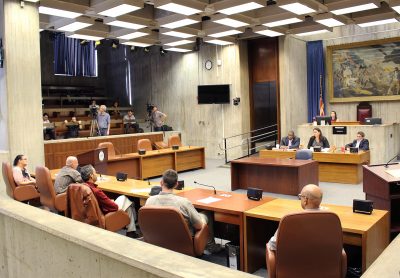
The Boston City Council’s Committee on Homelessness, Mental Health and Recovery met Tuesday to discuss the city’s plan to close the Project SOAR drug treatment facility at the end of the month.
Project SOAR, which stands for stability, opportunity, achievement and recovery, is a transitional program that helps drug addicts achieve and maintain sobriety, and then move on to permanent housing, said Beth Grand, co-director of the Homeless Services Bureau at the Boston Public Health Commission.
SOAR has 20 beds, in addition to nurses, substance abuse counselors and social workers, to help people develop a healthier lifestyle. In addition, the program aids individuals with HIV by providing the necessary medicine and physician care, according to the Boston Public Health Commission website.
City Councilor Tito Jackson, who called for the meeting after the city announced the shutdown, said the closing of the transitional program poses a direct threat to residents who are the most in need.
“I think it would be appropriate to open our meeting with Martin Luther King [Jr.’s] quote, ‘Our lives begin to end the day we become silent about things that matter,’” Jackson said. “The shutting [down] of the SOAR program is the day when we become silent about those that matter, especially those are most in need.”
Grand said despite the program being shut down, current SOAR members will likely receive housing within a short period of time following.
“We are concerned that every SOAR member has a place to stay,” Grand said. “I believe that every member will receive housing shortly after the project will close.”
Edward Torres, a SOAR member for the past 17 months, told The Daily Free Press before the hearing that without provided housing, residents like him would be forced to either live on the street or seek out other available shelters.
Torres said in his testimony to the City Council that he is concerned about the consequences of returning to a life without having a safe place to live, including the possibility that he could spread HIV more easily.
“Throwing us out on the street, I am going to be sharing the virus in the community,” Torres said. “And you think I am going to tell someone that I am HIV-positive?”
Without the medicine SOAR provides to him and other members, Torres said he believes the disease will quickly multiply and affect large numbers of people within the homeless community.
Several residents who received treatment from SOAR attended the hearing and expressed concerns about the closing of the program.
JoAnn Coull, 58, of Quincy, who has been sober for seven years because of SOAR, said the closing of the program would limit opportunities for many individuals to get a second chance at life after recovering from addiction.
“To say that SOAR provided help and services is such an understatement,” Coull said. “Stabilizing HIV-treating medications so you are not actually spreading the virus, regular eating habits, doctor appointments and mental health appointments, finding the foundation for recovery, they provided all these things to me and many of my peers.”



